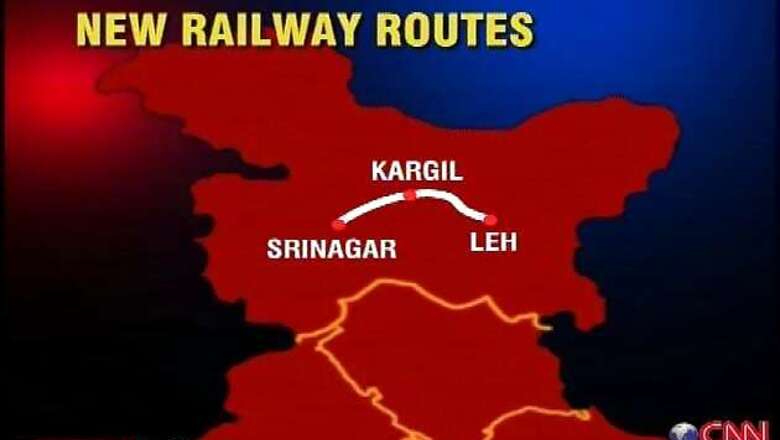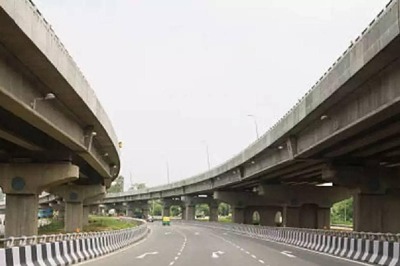
views
The strategic lines include the Srinagar-Kargil-Leh railway line that will cover a distance of more than 400 km cutting by half the current travel time of eight hours by road. Construction will take place at heights ranging from 6000 feet to 13,000 feet. Another line will connect the military hub of Pathankot with Leh, a distance of 278 km. A line will connect Misamari in Dhemaji district of Assam to Tawang in Arunachal Pradesh, a distance of 320 km. Along with other lines in Rajasthan and Uttarakhand, the armed forces will be able to move troops and equipment faster in an emergency. CNN-IBN's international affairs editor Surya Gangadharan joined IBNLive readers for an interaction on India's push to lay border rail tracks.
Q. Railways lines along the border areas is an enlightening concept given the climactic and weather distubances that block the movement of military troops. My question is or rather a literal concern is if these railway service is meant for carrying public too . Again, given the different and not very friendly geographical setup of our border areas hows the railway going to cope up with that. The recent spanish accident where in scores of people were killed still raises question mark about safety standards and speed limit for running a public transport. Asked by: Tanveer Md Masood
A. Railways at the end of the day are a public service. If you can transport troops/equipment, passengers is no issue. The terrain/climate are obvious issues but don't forget the railways is already running in parts of Kashmir. So some of the problems related to building railways in mountains/high altitude has been surmounted. Moving towards Leh also means accounting for mudslides, -30 degree temperatures and even lower in winter. But once the line reaches Leh the terrain is entirely flat and it would be relatively easy to extend it right up to our forward most posts. Regarding high speed, even at 70-100 km we have accidents. Frankly high speed train travel is a long way off in India.
Q. How many days it will take to complete the project and what is the risk involved? Asked by: Alok
A. Only surveys of some 10 odd lines has been done. Some of the survey work is being outsourced. The problem is not so much in the case of lines being laid in the plains (Punjab, Rajasthan etc), it's Ladakh and Arunachal where the challenge will lie. Both are mountainous, Arunachal is densely forested and the soil is soft, there are landslides when the monsoon sets in. Ladakh the construction season is short, about 3-4 months. If they decide to build throughout the year (as the Chinese did in Tibet) then things will move faster. But that's a big if.
Q. The train on these lines will be run by electricity or Diesel? Will the Hydro power generations in the hills help in supply power? Asked by: sundar1950in
A. India is switching to electricity. The Kashmir rail is entirely electric I think. Major trunk routes have been electrified. Sure hydro power generation in the hills will help but this is something being worked on.
Q. Is there a requirement for the lines to get cleared by MoEF on environment issues? Asked by: sundar1950in
A. Yes, there will be environment issues, land acquisition in some areas could be a problem. Ideally the government should mobilise work for this project on an inter-agency basis, bringing together different ministries so as to ensure time bound implementation.
Q. Will these rail lines get functional within this decade ?? Asked by: sundar1950in
A. Yeah we have seven years to go so hopefully if not in Ladakh or Arunachal, maybe somewhere in the plains it could get operational. Our major weakness lies vis a vis China, where we have nothing to compare to their border infrastructure. Maybe there could be a separate agency to deal with mountain rlys like the Konkan Rly.
Q. The only way this can happen if the railways minister or other powerful influential politician belongs to the region? Asked by: Arun
A. I'm afraid politicians from these regions are not powerful since they come from states with few seats in the Lok Sabha. J&K does have some clout but the valley commands more traction than Ladakh. However the army is a major presence in Ladakh and the locals are heavily dependent on it. So if the men in green play their cards right, ex-servicemen from there can be employed on the Ladakh railway. They will have no problems of adjusting to high altitude. Arunachal again the same problem, few seats in Lok Sabha.
Q. This would be a great move for out strategic reasons. but we need to make it happen in a short time and funds must be made available even at the cost of political reasons like looking at the political constituencies? Asked by: Annymous
A. Politics is the bane of India and we are heading into elections. So every politician is looking at his constituency, at getting votes. I'm afraid a strategic project of this nature is not going to be high on their list of priorities.
Q. If these line are for civilian use,can this help in Tourism getting a boon in the area? Asked by: sundar1950in
A. Yes it will. More tourists means not only revenue but it adds credibility to our hold over Ladakh and Arunachal.
Q. Hi Surya, Is this step good enough to maintain a edge at the borders for the next 10-20 years or just enough to catch up with China who has a good infrastructure in place already?..Are we thinking ahead of China or just catching up? Asked by: Jai
A. We are barely catching up. China's road infrastructure is already in place. With the Tibet railway they are several steps ahead on that front. The word is they will complete the full "loop" around all of their frontier regions in the next few years. They are also bringing a line from Lhasa to the Nepal border and another line will be positioned opposite Tawang. So let's be honest, we are not even there.
Q. Why priority on completing border railway lines. There are many other railway lines which were announced a decade ago are yet to start? Asked by: Sudhakar
A. Well the cabinet has cleared it, all of 80,000 crore. Some of the money will come out of the railway budget, not clear where the rest will come from. Govt am sure will make provision for it. Implementation is the key. The problem lies in too many railway projects being sanctioned for political expediency, they are unviable, the yields don't justify the money spent on it. It's a long unending story.
Q. What is the projected time frame? Asked by: kamal
A. This could take decades given the pace at which we work. But surveys have been done, in some cases it's been outsourced. The challenge will lie in Kashmir and Arunachal and I think that's where the priority should be.
Q. Don't you feel that the Railway Ministers who only think of their political interests would not think it important to release funds for strategic requirements? Asked by: AKS
A. All ministers look to their constituencies to re-elect them. Every railway minister has done that. Hopefully this time given the multiple threats we face, there will be a realisation that frontier railway projects must be given full support.
Q. What is the projected financial viability? Asked by: kamal
A. I'm not sure these will be financially viable. I don't think that's the idea. A strategic project by its very definition has a larger import. We need to secure our frontiers, be able to respond in the event of an emergency. Right now we are on the back-foot vis a vis China. Our army pickets man isolated stretches of land where the Chinese seem to come and go at will. This cannot continue.
Q. Surya, do your politicians understand strategic matters to give due importance to the strategic interests? Asked by: AKS
A. Most of them don't. There's little interest either. The younger lot maybe different but they are yet to come into their own.
Q. This has long been overdue. What steps should we take to ensure that we can mobility to our borders for faster troop deployment as well as access in conventional times? Asked by: EM
A. Railways is one answer. Better network of roads is another. In both areas we are lagging and far behind China. There are some advance landing grounds commissioned in the last few years but the connectivity between army posts on the frontier remains poor.



















Comments
0 comment